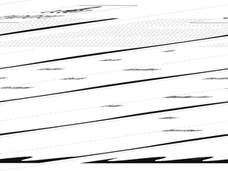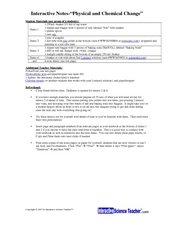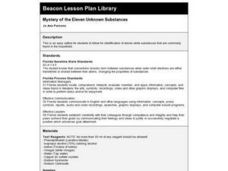Curated OER
Human Impact on the Environment and Pollution
Learners illustrate the impact humans have on the environment through analogies and models. They observe demonstrations of human impact and pollution and create a composite picture of how people can have an impact on their environment.
Curated OER
Identifying Acids and Bases
Sixth graders observe the physical and chemical change that can occur in an acid and a base. In this acids and bases lesson plan, 6th graders use cabbage juice to identify, compare, and contrast acids and bases.
Curated OER
Introduction to Neutraliization
Pupils explore acids and bases and the process of neutralization.T hey practice volume measurements and observe the neutralization of an acid
directly through bubble formation and indirectly through indicator color changes.
Curated OER
Using Your Senses
Young scholars use their senses to make observations. In this senses lesson plan, students investigate unknown substances by using their senses for observations. Young scholars identify the number of the substances used, the color, the...
Curated OER
The Investigation Of The Taste Buds
Students explore the sense of taste. In this biology lesson plan, students investigate the sense of tastes as they experience salty, sour, bitter, and sweet tastes. Students then discover how taste buds do their job.
Curated OER
Chemical Changes
Second graders investigate chemical changes and reactions and will identify four characteristics that indicate a chemical change. In this chemical change lesson plan, 2nd graders perform experiments that promote chemical changes. They...
Curated OER
Heat Loss and Gain in Physical Changes and Chemical Reactions
Pupils measure the heat of physical and chemical changes in reactions. In this chemistry lesson students determine at what extent changes emit or absorb heat.
Curated OER
What is a Karst?
Students examine the process that creates limestone. In this limestone lesson plan students complete a worksheet and participate in a lab activity.
Curated OER
Exploring Rocks
Students recognize differences in the size, shape, texture, and color of different rocks. In this rocks lesson plan, students also learn and repeat back how a volcano erupts and make one out of a toilet paper tube.
Curated OER
Chemical Changes
Students explore chemical changes. in this lesson about the properties of chemical changes, students do experiments, observe, and record results. Students complete four experiments in order to observe chemical changes. In each experiment...
Curated OER
Is Air a Fluid?
Students discuss the physical properties of fluids and then demonstrate that air carbon dioxide and oxygen) is a fluid by creating currents.
Curated OER
Physical and Chemical Change
Young scholars study the differences between physical and chemical changes. In this physical and chemical lesson plan students complete several labs to help them to see the differences between these changes.
Curated OER
Mystery of the Eleven Unknown Substances
Fourth graders identify eleven white substances that are commonly found in the household. They, in pairs, perform experiments on a variety of substances, and must identify them based on the reactions they observe.
Curated OER
Relationships and Biodiversity
Young scholars examine diversity on the planet and the differences within a species. In this investigative lesson students complete a lab that allows young scholars to better understand the relatedness between plants.
Curated OER
Conserving Land, Water and Air
Students take a hands on approach to learning about conservation. In this conservation lesson students divide into groups and complete several demos, view a PowerPoint presentation and complete a handout.
Curated OER
Can Chromatography Separate A Pigment?
Students separate a mixture of pigments with ion exchange chromatography and predict whether the ion-exchange matrix is positively or negatively charged based on the type of pigment bonded to the matrix.
Curated OER
A Very Simple Conductivity Meter
Learners conduct a simple conductivity meter to test the ionic or non-ionic nature of water samples including one from their home.
Curated OER
Vegetables
Third graders evaluate what happens when vegetables are cooking in different solutions. They observe the effect of color change on cooking vegetables.
Curated OER
Natural Dye Lesson Plan
Young scholars investigate major pigments which occur naturally in fruits and vegetables, and to use them to dye a number of items. They study the effects of pH on anthocyanin on pigments.
Curated OER
Household Hazardous Waste Identification
Fourth graders discuss the concept of reduce, reuse and recycle. They identify products in their homes that are hazardous and discover alternatives to them. They examine the inventory of other classmates hazardous materials.
Curated OER
Ocean Absorption Lab
Learners examine various techniques that can reduce carbon dioxide in the atmosphere, and use chemistry to simulate oceanic sequestration. They conduct an experiment involving the method of oceanic absorption for carbon sequestration,...
Curated OER
Geo Sequestration Lab
Students explore geologic sequestration as a technique used to reduce carbon dioxide in the atmosphere. They use chemistry to stimulate oil mining. Students conduct an experiment to learn about geo carbon sequestration.
Other popular searches
- Vinegar and Baking Soda
- Vinegar & Baking Soda
- Baking Soda Vinegar Lab
- 5th Baking Soda Vinegar
- Gas Baking Soda Vinegar























